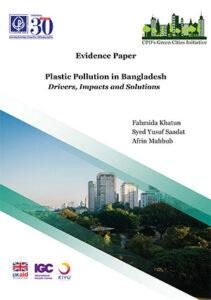 Plastic pollution is quite widespread in Bangladesh, as the country exhibits a pervasive throwaway culture where waste is deliberately discarded on the streets of urban cities. In 2020, the total plastic waste collected in Dhaka alone was 646 tons which accounts for only 10 per cent of the total waste. About 48 per cent of this waste ends up in landfills, while only 37 per cent of the plastic waste is recycled. About 12 per cent of the plastic waste is dumped in small rivers, and the rest 3 per cent is disposed of indiscriminately. Although city corporations are responsible for waste management, most of the waste including plastic waste is collected by the informal sector. Furthermore, there are insufficient information, knowledge and policy considerations which directly address the issue of plastic pollution in Bangladesh. The country currently has limited and ineffective regulations governing plastic pollution. The practice of using alternatives to plastics must be put into effect by further policy initiatives and marketbased incentives. This will help limit plastic products from entering the value chain and reduce plastic pollution in urban cities of Bangladesh.
Plastic pollution is quite widespread in Bangladesh, as the country exhibits a pervasive throwaway culture where waste is deliberately discarded on the streets of urban cities. In 2020, the total plastic waste collected in Dhaka alone was 646 tons which accounts for only 10 per cent of the total waste. About 48 per cent of this waste ends up in landfills, while only 37 per cent of the plastic waste is recycled. About 12 per cent of the plastic waste is dumped in small rivers, and the rest 3 per cent is disposed of indiscriminately. Although city corporations are responsible for waste management, most of the waste including plastic waste is collected by the informal sector. Furthermore, there are insufficient information, knowledge and policy considerations which directly address the issue of plastic pollution in Bangladesh. The country currently has limited and ineffective regulations governing plastic pollution. The practice of using alternatives to plastics must be put into effect by further policy initiatives and marketbased incentives. This will help limit plastic products from entering the value chain and reduce plastic pollution in urban cities of Bangladesh.
Authors: Fahmida Khatun, Syed Yusuf Saadat and Afrin Mahbub
Publication period: March 2023



